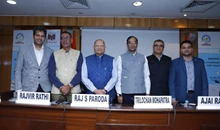
Menstruation is an expression we use to denote that time of the month! Weeping over the atrocious pain of period cramps, sustaining yourself from the discomfort, the bizarre mood swings, and losing interest in everything that you loved before, it is a rollercoaster ride for most girls around the world.
However, menstruation doesn't hit the same for everybody. Some are privileged as they go through this period smoothly, while others face discomfort using unhygienic things to stop their period blood and it becomes an excruciating experience for them.
From cow dung to silicon menstrual cups, Indian women have seen it all over the past few ages. In fact, in this age and time, women are still using traditional and unhygienic things during their menstruation.
Menstrual Products Used in India
Cow Dung Patties
-
This may sound a bit strange but women in the outskirts of several states, such as Ranchi and Jharkhand, use cow dung as an alternative to menstrual products. They do not use this directly on the skin, but wrap it in a cloth and place it accordingly to capture the flow without staining.
Cotton Balls
-
Cotton balls are wrapped around in cloths or bandages and fixed in undergarments in such a manner that prevents leakage. Some might find this feasible and safe; however, there is a serious chance of vaginal infection that can arise if the cotton balls aren’t sterile.
Tampons
-
Tampons are the type of absorbent that provides internal protection. They are a kind of plug of soft material (cotton) which is inserted into the vagina to absorb the menstrual flow before it leaves the body. Though they are easy to carry but are expensive and not easily degradable in nature.
Menstrual Cups
-
This could be a new invention for the poor women population and an alternative to sanitary pads and tampons. They are like cups made of medical-grade silicone rubber which makes them easy to fold and get inserted into the vagina to collect menstrual blood. They can be worn for up to 6–12 hours depending upon the amount of menstrual flow, so it needs to be removed and emptied less frequently. They are reusable and environment-friendly.
Sanitary Pads
-
These are the most commonly used menstrual product available in the market. One piece of the sanitary pad is convenient and should be changed every 3–4 hours, even if you have a light flow to avoid itching and irritation. Regular changing prevents the buildup of bacteria and stops odor.
Reusable Pads
-
These pads are washed after each time you wear them. They're sold in natural health stores and online. These kinds of pads snap or clip onto a girl's underwear. Girls might use these pads because they feel they're better for the environment or to save money. However, this one may not be a suggestible idea during the time of menstruation.
Expert’s Advice on Menstrual Hygiene
With 13 years of experience in Gynaecology, Dr Kanika Chopra, Associate Professor, Department of Obstetrics and Gynaecology, Lady Hardinge Medical College, shared her insights with Krishi Jagran on the inadequate knowledge of Menstrual health among the female population of the country.
“It is high time we educate the females. Very basic information should be given regarding menstruation to prevent them from catastrophic events which can happen from the use of detrimental menstrual products,” said Dr Chopra.
She added, “Not only in the rural areas but if you address the issues in metropolitan cities like Delhi, the patients who come to our hospital, even they are also not aware of how should they deal with the menstruation period. They are using cloth, old ones taken out from some rags. Moreover, even if they are using sanitary napkins, they don't know what's the frequency of change of sanitary napkins and which sanitary napkin ideally they should use.”
Dr Chopra further talked about the instances she experienced while visiting schools in her nearby area. There, she recognized that even well-educated girls from good schools are unaware of how to deal with menstruation. They do not have sufficient knowledge regarding menstrual hygiene.
Dr Kanika Chopra explained the outcomes that one might have to face if they are not aware of how to take care of their menstrual hygiene.
Dr says, “If we are not aware of how to deal with menstruation, it will increase the rates of reproductive tract infections. So these reproductive tract infections are present in various ways. Patients can come with discharge per vagina, they can come with pain in the lower abdomen, and that is why we are getting more cases of infertility these days, cases of women who are not able to conceive. Infections ascend from your vaginal area and go towards your uterus and affect the tubes. And the most common cause of infertility is tubal infertility. So, if the tubes get damaged due to some kind of infection, then infertility takes place. The patient also has to go through a lot of stress which is often ignored. So, if we deal with the root cause, that is to make the girls and the women aware of menstrual hygiene, maybe we can decrease the rates of infertility and the problems they suffer because of this.”
In the end, Dr Chopra opined on the best menstrual product which females can use which is environmentally sustainable and has the least negative impacts on the human body.
“I think the most suitable would be a menstrual cup because it is made up of a material (silicon) which is not allergic, it is easy to wash, and it is easy to carry. If one can invest in a single quality cup, then that can be used for four to five years. The only thing is you should get into the habit of inserting it and using it. So when you have a hang-on of how to use that particular product, it'll be comfortable. Moreover, it is environmentally friendly as well,” said Dr Chopra.











